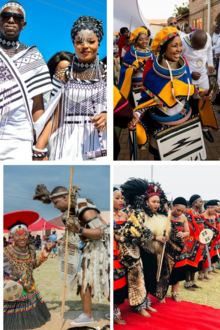
Back شعب نجونى (مجموعه عرقيه فى جنوب افريقيا) ARZ Нгуні (народы) Byelorussian Nguni German Ngunoj Esperanto Nguni Spanish Nguni Basque Ngunit Finnish Nguni (peuple) French न्गूनी लोग Hindi Nguni Italian
 Top left, Xhosa; Top right, Ndebele; Bottom left, Zulu; Bottom right, Swati | |
| Languages | |
|---|---|
| Nguni languages IsiXhosa, IsiZulu, Siswati, Ndebele | |
| Religion | |
| Christianity and (uThixo or Qamata) Unkulunkulu | |
| Related ethnic groups | |
| Sotho-Tswana peoples, Tsonga people, Khoisan, San people and Ngoni people |
The Nguni people are an ethnolinguistic grouping of Bantu nomads who migrated from central Africa into Southern Africa, made up of ethnic groups formed during the late Iron Age, with offshoots in neighboring colonially-created countries in Southern Africa.[1] Swazi (or Swati) people live in both South Africa and Eswatini, while Ndebele people live in both South Africa and Zimbabwe.
The Xhosa, local to the Eastern Cape, established tribal sub-federations—theThembu, Mpondo, and Mpondomise—in the 16th century. The homeland of the Xhosa people is marked by lands in the Eastern Cape from the Gamtoos River up to Umzimkhulu near Natal, bordered by the frontier of an expanding Dutch Cape Colony.
Both the Matabele of Western Zimbabwe and the Ngoni migrated northward out of South Africa in the early 19th century, during a politically tumultuous era that included the Mfecane and Great Trek.
In South Africa, the regions historically comprising the territories of the Ndebele, Swazi, Xhosa, and Zulu Kingdoms are located in the latter-day provinces of the Eastern Cape, Gauteng, KwaZulu-Natal, Limpopo and Mpumalanga. The most notable of these kingdoms are the Zulu Empire founded by Shaka, a warrior-king whose conquest took place in the early nineteenth century, and the Xhosa Kingdom, infamous for its belligerence in the Frontier Wars.
Overall, the Nguni cultural group is made up of the Mbo, Lala, Ntungwa, Hlubi, Xhosa, Mthethwa Paramountcy, Ngidi, Ndwandwe, Zulu, Ngoni, Swati and Ndebele ethnic groups.
In Zimbabwe, the Ndebele people live primarily in the province of Matabeleland.[1]
- ^ a b "isiNdebele for beginners. Northern Ndebele language in Africa". www.northernndebele.blogspot.com. Retrieved November 12, 2021.